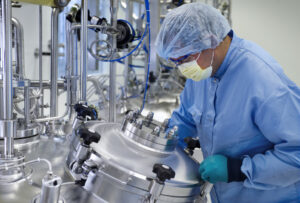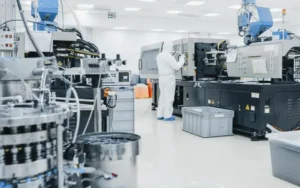The pharmaceutical industry and Industrial Equipment is one of the most essential sectors in the world. Pushed by the want to Loosen safe, powerful, and no-go medicines for patients. To obtain this, pharmaceutical groups rely on trendy industrial equipment designed to fulfill stringent renowned requirements and regulatory Needs. This device plays a pivotal role in making sure of precision, consistency, and performance at some stage in the production process.
We can explore the important merchant systems used in pharmaceutical product production. Detailing their functions and importance in the production of medicinal drugs that meet global healthcare standards.

Mixers and Blenders: Ensuring Uniformity in Formulations
Mixers and Blending machines are integral in the preliminary degrees of pharmaceutical production. These machines make sure that lively pharmaceutical components (APIs) are uniformly combined with carriers to create a smooth blend. This uniformity is vital for making sure that every dose of the medication supplies uniform Healing effects.
Advanced mixers and blenders are designed to write lots of formulations. Withal with dry powders and moist grains. Ribbon blenders, high-shear mixers, and V-blenders are normally used inside the industry. Each form of mixer is focused on certain needs, together with retaining the soft-hued nature of positive powders or achieving a speedy and thorough mixture.
Improving Flowability and Compressibility
Granulation is a key procedure within the manufacturing of consistent paperwork in small amount like drugs and tablets. Fine powders, can moreover have poor waft characteristics. Are transformed into granules to enhance their flowability and compressibility. This ensures smooth and untried processing in downstream operations.
Particle makers are misogynists in diverse types, inclusive of wet granulators. Dry granulators, and fluid bed granulators. Wet granulators use a tightness technique to Form powder lumps at the same time as dry granulators depending upon compaction. Fluid mattress granulators integrate the procedures of granulation and drying in an unmarried step, streamlining production and reducing processing time.
Tablet Press Machines: Precision in Dosage Form Production
Tablet printing machines are important to the manufacturing of capsules, which are one of the most unusual kinds of remedy. These machines shrink granules or powders into tablets of particular size, weight, and dosage.
There are essential varieties of tablet presses: single-punch presses and rotary pill presses. Single-punch presses are commonly used for small-scale production, plane as rotary presses are designed for excessive-quantity manufacturing. Rotary tablet presses are especially prized for their sufficiency in producing large portions of capsules with steady first-rate and minimal waste.
Encapsulation Machines: Accurate Filling for Capsules
Capsules are every other widely used spoonful shape. Encapsulation machines play an important role in their manufacturing. These machines fill drugs with powders, granules, or beverages, making sure of well-judged dosing and keeping the integrity of the medicine.
Encapsulation machines are designed for each tough and gentle gelatin pill. They are prepared with wide eras to make unrepealable precision and performance, making them vital in large-scale pharmaceutical production.
Coating Machines: Enhancing Tablets and Capsules
Coating is a vital step in the manufacturing of many tablets and tablets. Coatings serve multiple functions, which include enhancing the aesthetic appearance of the product, masking unpleasant tastes, and controlling the release of the medicine in the body.

Coating machines practice a uniform layer on the surface of capsules or pills. Film coating, sugar coating, and fluid mattress coating are many of the maximum not unusual strategies used. Modern coating machines are designed to make certain uniform coverage efficient processing, and assembly both aesthetic and useful requirements.
Sterilization Equipment: Maintaining Product Safety
Sterilization is a crucial thing in pharmaceutical manufacturing, especially for products that need to be free of microbial infection. Sterilization gadget guarantees that raw materials, tools, and completed products meet the strict protection requirements required in the pharmaceutical enterprise.
Autoclaves, dry warmness ovens, and ethylene oxide sterilizers are usually used as sterilization methods. Autoclaves use steam and stress to sterilize devices and merchandise, at the same time warm ovens are ideal for sterilizing glassware and metallic gear. Ethylene oxide sterilizers are particularly beneficial for heat-sensitive materials.
Filling and Packaging Machines: Ensuring Accuracy and Protection
Filling and packaging machines are vital for the very last stages of pharmaceutical manufacturing. These machines ensure that medicinal drugs are correctly measured, securely sealed, and protected from environmental elements.
Liquid-filling machines are used for syrups and injectable merchandise, at the same time as powder-filling machines deal with dry formulations. Blister packaging machines are designed to protect tablets and drugs from moisture and contamination, and cartooning machines are used for secondary packaging. Automation in those techniques enhances accuracy, efficiency, and compliance with regulatory standards.
Quality Control Instruments: Guaranteeing Consistency and Safety
Quality warranty is the spine of pharmaceutical manufacturing. Advanced gadgets are used at every stratum of production to make sure that products meet stringent first-class standards.
High-Performance Liquid Chromatography (HPLC) is normally used to investigate the purity of pharmaceutical compounds. Dissolution testers compare the venting price of energetic ingredients, making sure that medicines perform as intended. Spectrophotometers are used for recipe identity and quantification, offering vital records for weightier management.
Reactor Systems: Precision in Chemical Synthesis
The production of lively pharmaceutical ingredients (APIs) entails ramified chemical reactions, which might be achieved in reactor structures. These structures manipulate temperature, and strain, and combine to make an unrepealable precise, and untried synthesis.
Glass-coated reactors are used for coping with corrosive chemical substances, while stainless steel reactors are perfect for high-pressure applications. Reactor structures are designed to meet the exacting demands of API production, ensuring consistency and safety inside the very last product.
Centrifuges: Efficient Separation and Purification
Centrifuges are used to separate components based on their density. In pharmaceutical manufacturing, they play an essential position in processes like crystallization, liquid-liquid separation, and strong-liquid separation.
Modern centrifuges are designed for excessive-speed operation and precise manipulation, ensuring that separation strategies are untried and reliable. They are a key factor in the production of many pharmaceutical merchandise, particularly in the purification of APIs.
The Importance of Advanced Equipment
The success of pharmaceutical production hinges on the use of wide commercial devices. From ensuring the uniformity of formulations to keeping the safety and efficacy of the very last product, this gadget is crucial to each stage of production.
By investing in modern-day machinery, pharmaceutical companies can optimize their techniques, lessen manufacturing prices, and hold compliance with regulatory requirements. This no longer only guarantees the pleasantness of the medicinal drugs but also fosters innovation and competitiveness inside the enterprise.
Conclusion
Pharmaceutical Industrial Equipment manufacturing is a complicated and notably regulated manner that needs precision, performance, and trueness to strict first-rate standards. Industrial gadget plays a pivotal role in reaching these desires, permitting corporations to produce medicinal drugs that meet the very weightier requirements of safety and effectiveness.
